What is Laser Teeth Whitening
Laser teeth whitening, also known as in-office teeth whitening, is a cosmetic dental procedure designed to brighten your smile significantly in a single session. Unlike over-the-counter whitening products, this method uses a professional-strength whitening gel activated by a specialized laser or light source. This process accelerates the bleaching action, delivering dramatic results in a relatively short amount of time. This treatment has gained popularity for its efficiency and the noticeable difference it makes in the overall appearance of your teeth. The entire process is conducted under the supervision of a dental professional, ensuring safety and optimal outcomes. If you desire a dazzling, white smile quickly, laser teeth whitening might be an ideal choice.
The Science Behind Laser Teeth Whitening
The science behind laser teeth whitening centers on the chemical reaction between the whitening agent and the stains on your teeth. The primary whitening agent is usually a high-concentration hydrogen peroxide or carbamide peroxide gel. When this gel is applied to the teeth, the laser or light source emits a specific wavelength that catalyzes the breakdown of the peroxide. This process releases oxygen molecules that penetrate the enamel and dentin of the teeth, breaking down the stain molecules and making the teeth appear lighter. This process is effective because it targets the discolored compounds within the tooth structure, effectively reducing or removing them. The heat from the laser or light source helps accelerate this process, leading to faster and more pronounced whitening compared to home-based treatments.
How Laser Teeth Whitening Works
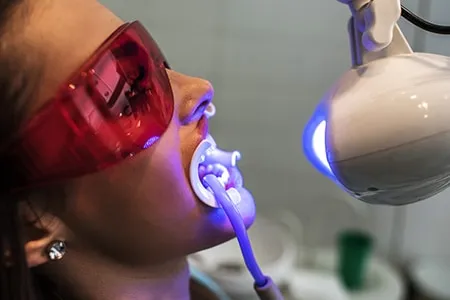
The process of laser teeth whitening typically involves several key steps. First, the dentist or dental hygienist will clean your teeth to remove any plaque or debris, ensuring the whitening gel can effectively penetrate the enamel. A protective barrier, such as a cheek retractor and a protective gel, is then applied to the gums to prevent irritation from the whitening agent. The whitening gel is applied to the surface of the teeth. After the gel is applied, the laser or special light is directed onto the teeth, activating the whitening agent. This process is usually repeated multiple times during a single session, with each cycle lasting for a set duration. Finally, the gel is removed, and your teeth are rinsed. The results are immediately visible, providing a significant boost to the brightness of your smile. This technique is a quick and efficient way to achieve a dazzling smile.
The Top 5 Benefits of Laser Teeth Whitening
Benefit 1 Immediate Whitening
One of the most appealing benefits of laser teeth whitening is the immediate results. Unlike other whitening methods that require weeks or months to show significant improvement, laser whitening provides noticeable brightening in a single office visit. This instant transformation is ideal for individuals seeking a quick cosmetic fix for special events or to boost their confidence rapidly. The immediate impact of the procedure is a primary reason why this treatment remains a popular choice for those looking to enhance their smile quickly. The ability to walk out of the dentist’s office with a significantly whiter smile is a major advantage.
Benefit 2 Professional Results
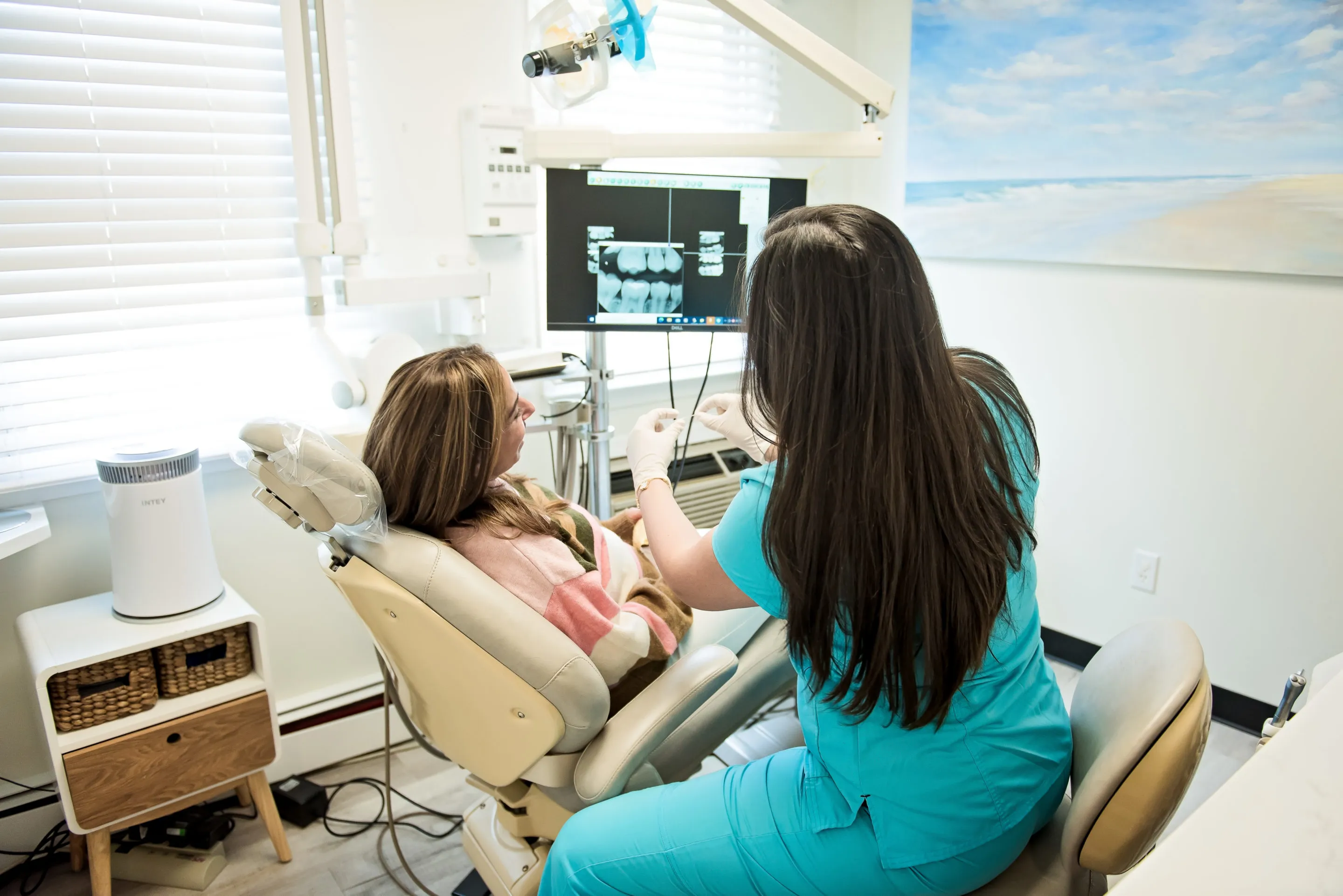
Laser teeth whitening is performed by dental professionals, which ensures superior results compared to over-the-counter products. Dentists have the expertise to assess your teeth and gums, determining the safest and most effective treatment plan for your specific needs. They utilize professional-strength whitening agents that are more potent than those available for home use. This professional approach allows for more dramatic and consistent whitening, often achieving several shades lighter in a single session. Furthermore, dentists are equipped to handle any potential complications and can provide post-treatment care and advice to maintain the results.
Benefit 3 Effective Stain Removal
Laser teeth whitening is highly effective at removing a wide range of stains, including those caused by coffee, tea, red wine, and tobacco. The laser light enhances the penetration of the whitening agent, breaking down stubborn stains that might not respond to other methods. This deep cleaning action removes both surface stains and those embedded within the enamel. The result is a more uniform and brighter tooth color. The effectiveness of this method makes it a powerful tool for restoring the natural whiteness of teeth and improving overall smile aesthetics. It targets a broad spectrum of discoloration, making it versatile for many patients.
Benefit 4 Enhanced Confidence
A brighter, whiter smile can significantly boost your self-esteem and confidence. The immediate and dramatic results of laser teeth whitening can create a positive change in how you perceive yourself. This improved self-image can translate into increased confidence in both social and professional settings. Patients often report feeling more comfortable smiling, laughing, and interacting with others after undergoing laser teeth whitening. This enhancement in self-assurance is a significant benefit, making the investment in the procedure worthwhile for many individuals. It is a powerful cosmetic procedure with emotional benefits.
Benefit 5 Long-Lasting Results
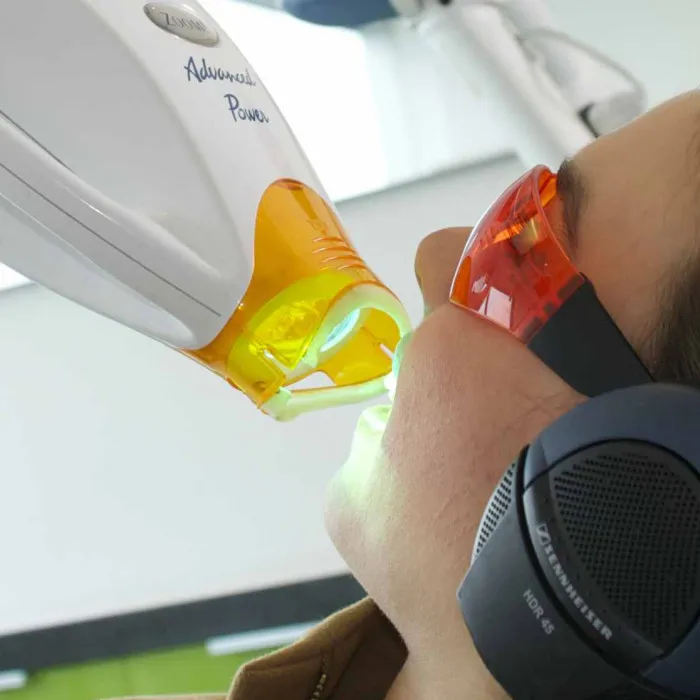
While not permanent, the results of laser teeth whitening can last for an extended period, typically ranging from several months to a few years, depending on your lifestyle and oral hygiene habits. Proper maintenance, including regular brushing, flossing, and avoiding stain-causing foods and beverages, can help extend the longevity of the whitening effect. Dentists often provide maintenance instructions and may recommend touch-up treatments to sustain the desired level of whiteness. Regular dental check-ups and professional cleanings also help in preserving your bright smile. Maintaining these habits significantly increases the lifespan of the treatment.
Who is a Good Candidate for Laser Teeth Whitening
Good candidates for laser teeth whitening are those with healthy teeth and gums who are looking to improve the appearance of their smile. Ideal candidates have noticeable stains or discoloration from food, drinks, or aging. It’s important to have realistic expectations about the results; the procedure is most effective on natural teeth and may not work as well on crowns, veneers, or fillings. Individuals with sensitive teeth or existing dental issues should discuss these concerns with their dentist. During the consultation, the dentist will assess your oral health, evaluate the cause and extent of discoloration, and determine if laser whitening is the right choice for you.
The Laser Teeth Whitening Process
Preparation for the Procedure
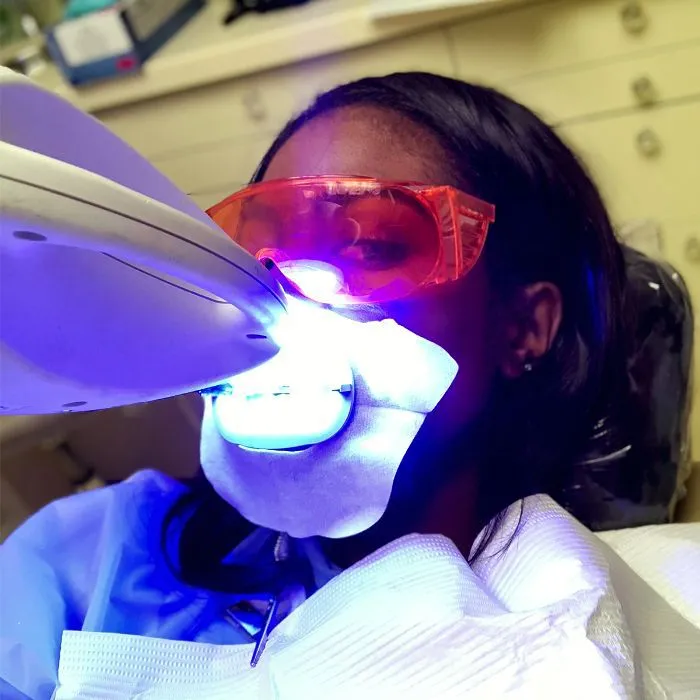
Before undergoing laser teeth whitening, your dentist will conduct a thorough oral examination to ensure your teeth and gums are healthy and free from any issues like cavities or gum disease. A professional cleaning is often performed to remove surface stains and plaque, maximizing the effectiveness of the whitening treatment. Your dentist will also discuss your expectations and explain the process, including potential side effects. This consultation is crucial to determine if laser teeth whitening is suitable for your needs and to address any concerns. You may also receive pre-treatment instructions, such as avoiding certain foods or drinks before the procedure.
The Laser Treatment Session
The laser teeth whitening session typically takes about one hour. The procedure begins with the application of a protective barrier to shield your gums. A whitening gel is applied to the teeth, and the laser light is then directed at the teeth to activate the whitening agent. This process is often repeated several times, depending on the desired outcome and the severity of the stains. Throughout the session, your dentist will monitor your progress and ensure your comfort. After the treatment, the whitening gel is removed, and your teeth are rinsed. You will notice an immediate improvement in the brightness of your smile.
Post-Treatment Care and Maintenance
After laser teeth whitening, it’s essential to follow your dentist’s post-treatment instructions to maintain your results. This typically involves avoiding stain-causing foods and drinks, such as coffee, tea, red wine, and dark-colored sauces, for the first few days. You should also maintain good oral hygiene by brushing your teeth twice a day, flossing daily, and using a fluoride toothpaste. Your dentist might also recommend using a whitening toothpaste or at-home whitening touch-up treatments to further prolong the whitening effect. Regular dental check-ups and professional cleanings are crucial for overall oral health and to help maintain your bright, white smile.
Potential Risks and Side Effects
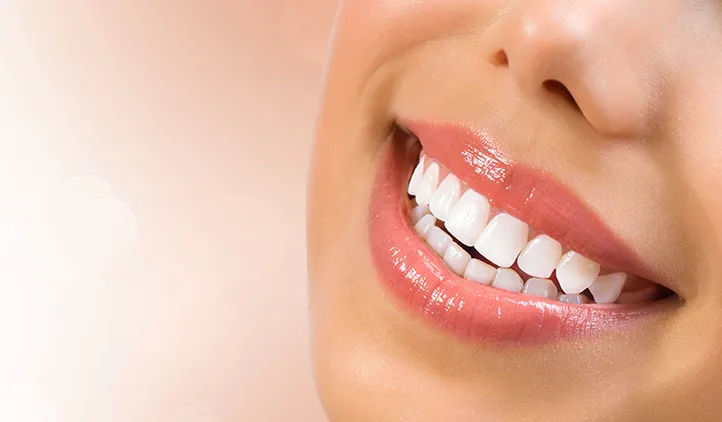
Laser teeth whitening is generally a safe procedure, but there are potential risks and side effects to be aware of. The most common side effect is temporary tooth sensitivity, which usually subsides within a few days. Some patients may also experience mild gum irritation. Rare side effects include uneven whitening or damage to existing dental work. It is important to discuss any concerns or medical conditions with your dentist before undergoing the procedure. They can provide a thorough assessment and minimize any potential risks. Ensure you follow the post-treatment care instructions for the best and safest results.
Cost of Laser Teeth Whitening
The cost of laser teeth whitening can vary depending on several factors, including the location, the dentist’s fees, and the extent of the treatment. On average, the procedure can range from several hundred to over a thousand dollars. The price usually includes the consultation, the procedure itself, and any necessary aftercare instructions. While the cost is higher than that of over-the-counter whitening products, the results are often more dramatic and long-lasting. It is advisable to inquire about the total cost and any potential payment options during your consultation. It’s a worthwhile investment for those seeking a significant improvement in their smile’s appearance.
Laser Teeth Whitening vs Other Methods
Compared to other teeth whitening methods, laser teeth whitening offers several advantages. Home whitening kits and over-the-counter products are generally less effective and can take weeks or months to show results. Professional whitening, such as laser teeth whitening, is more powerful and provides faster, more noticeable results. Laser whitening is also more effective at removing stubborn stains. While alternatives like veneers or dental bonding can permanently change the color of your teeth, they are more invasive and expensive. Laser teeth whitening is a less invasive and cost-effective option. The best method depends on your individual needs, budget, and the severity of discoloration. Consulting with your dentist will help you decide which is the right choice.
